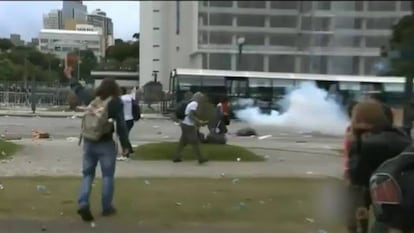More than 150 injured during violent teachers’ demonstration in Brazil
Government officials in Paraná state believe radical group infiltrated protest over pensions

More than 150 people were reported injured – eight of them seriously – after police in Curitiba, Brazil charged at a peaceful teachers’ demonstration on Wednesday. The protest turned violent after a group of hooded youths infiltrated the rally, officials said.
Around 20,000 people showed up for the march, which was organized by teachers groups in the Paraná state capital to protest proposed changes to their retirement system.
The march was held to protest planned changes to teachers’ pensions
When the demonstrators reached the regional Legislative Assembly, a large group tried to force its way into the building, where lawmakers were meeting to vote on the pension reform.
Paraná governor Carlos Alberto Richa called out the state military police to prevent the demonstrators from getting inside. According to witnesses, officers began firing rubber bullets, tear gas and water cannon to disperse the crowd.
Some in the demonstration answered the volley by throwing rocks and other debris at police.
“It looked like a war,” said Curitiba Mayor Gustavo Fruet via his Twitter account. Fruet represents the opposition Democratic Workers Party.
According to his office, 45 people needed hospital treatment. The local Gazata do Povo daily reported that five arrests were made.
Governor Richa, of the Brazilian Social Democracy Party (PSDB), explained that the demonstration was infiltrated by the so-called “Black Bloc,” a group of youths who wear black hoods and clothing and cause disturbances at public rallies, including smashing cash machines and provoking police.
In recent months, anti-government protests have swelled across Brazil as the country is beset by a growing economic recession and runaway inflation.
One of the largest protests – by some accounts the biggest turnout of the public since democracy returned in 1985 – took place in São Paulo on March 15, when nearly a million people took to the streets to demand President Dilma Rousseff’s resignation. Similar calls were made at another street rally held on April 12, but with a much lower turnout.
It looked like a war” Curitiba Mayor Gustavo Fruet
To deal with the economic crisis, Rousseff has announced a series of unpopular spending cuts at all public agencies, including cutbacks in public welfare services.
The embattled president has also been tarnished by the mammoth corruption investigation into the payoff scandal at state oil company Petrobras, which has ensnared many of her close political allies.
Three other Brazilian states – Pernambuco, São Paulo and Santa Catarina – are also holding teachers’ demonstrations to demand better working conditions.
Tu suscripción se está usando en otro dispositivo
¿Quieres añadir otro usuario a tu suscripción?
Si continúas leyendo en este dispositivo, no se podrá leer en el otro.
FlechaTu suscripción se está usando en otro dispositivo y solo puedes acceder a EL PAÍS desde un dispositivo a la vez.
Si quieres compartir tu cuenta, cambia tu suscripción a la modalidad Premium, así podrás añadir otro usuario. Cada uno accederá con su propia cuenta de email, lo que os permitirá personalizar vuestra experiencia en EL PAÍS.
¿Tienes una suscripción de empresa? Accede aquí para contratar más cuentas.
En el caso de no saber quién está usando tu cuenta, te recomendamos cambiar tu contraseña aquí.
Si decides continuar compartiendo tu cuenta, este mensaje se mostrará en tu dispositivo y en el de la otra persona que está usando tu cuenta de forma indefinida, afectando a tu experiencia de lectura. Puedes consultar aquí los términos y condiciones de la suscripción digital.








































